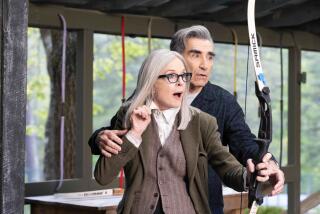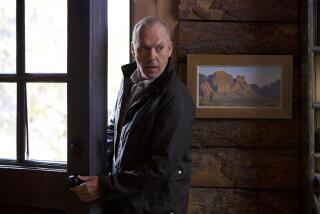TV REVIEW : ‘Great Performances’ Welcomes Buster Keaton’s Silent ‘Hospitality’
- Share via
“Our Hospitality” (1923), which airs at 9 tonight on Channel 28 as part of public TV’s “Great Performances” series, is generally considered to be Buster Keaton’s first true feature--”The Three Ages” having been a compilation--and one of his major accomplishments.
To watch it today, in what PBS describes as a “completely restored and electronically improved” version with a new score by Carl Davis, is to be reminded of the tremendous sense of freedom that the great silent-era clowns had. Their elaborate gags had to be carefully planned, but a sense of graceful spontaneity also reigned in their work.
“Our Hospitality” in particular gives the impression that Keaton himself might not always have known exactly what was coming next for his famously impassive alter-ego. It’s a delight but a bit discursive; the relentless, cooly comic logic of “The Navigator,” for example, was yet to come.
This film is Keaton’s take-off on the Hatfield and McCoy feud. He casts himself as a young man raised on his aunt’s farm in Manhattan (at Broadway and 42nd Street!) who, after coming of age, heads South to collect his inheritance.
Keaton devotes the first part of his picture to all the mishaps that befall him as a passenger aboard a quaint and exceedingly delicate-looking 1830 train traveling through Appalachia. Once he arrives at his destination, he unwittingly heads right smack into his family’s ancient enemies--and falls for its fair maiden in the process.
Keaton works the tradition of Southern hospitality for all it’s worth: As long as he is a guest in the white-columned mansion of those sworn to kill him, he is safe. How he escapes and how he survives leads to timelessly amusing and progressively dangerous escapades, one involving an attempt to navigate a waterfall.
There’s a poignant footnote to this lovely, airy comedy. Keaton cast his pretty wife, Natalie Talmadge (sister of the more famous Constance and Norma), as his leading lady and even used their baby son in the film, as a way of holding together his marriage, already in trouble.
Like all of Keaton’s films, “Our Hospitality” is suffused with a wistfulness, an awareness of the sadness that always lurks under the laughter.
More to Read
The complete guide to home viewing
Get Screen Gab for everything about the TV shows and streaming movies everyone’s talking about.
You may occasionally receive promotional content from the Los Angeles Times.






